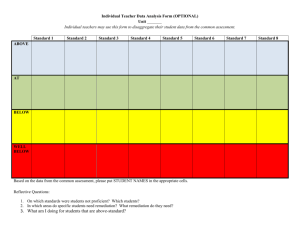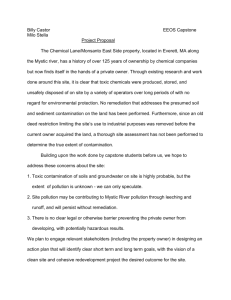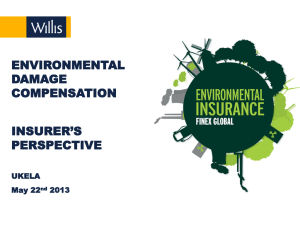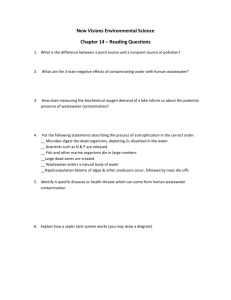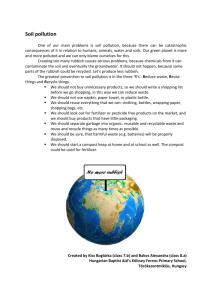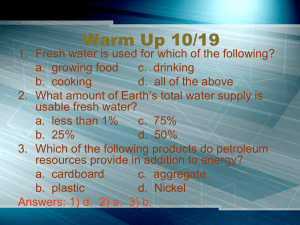Courses objectives
advertisement
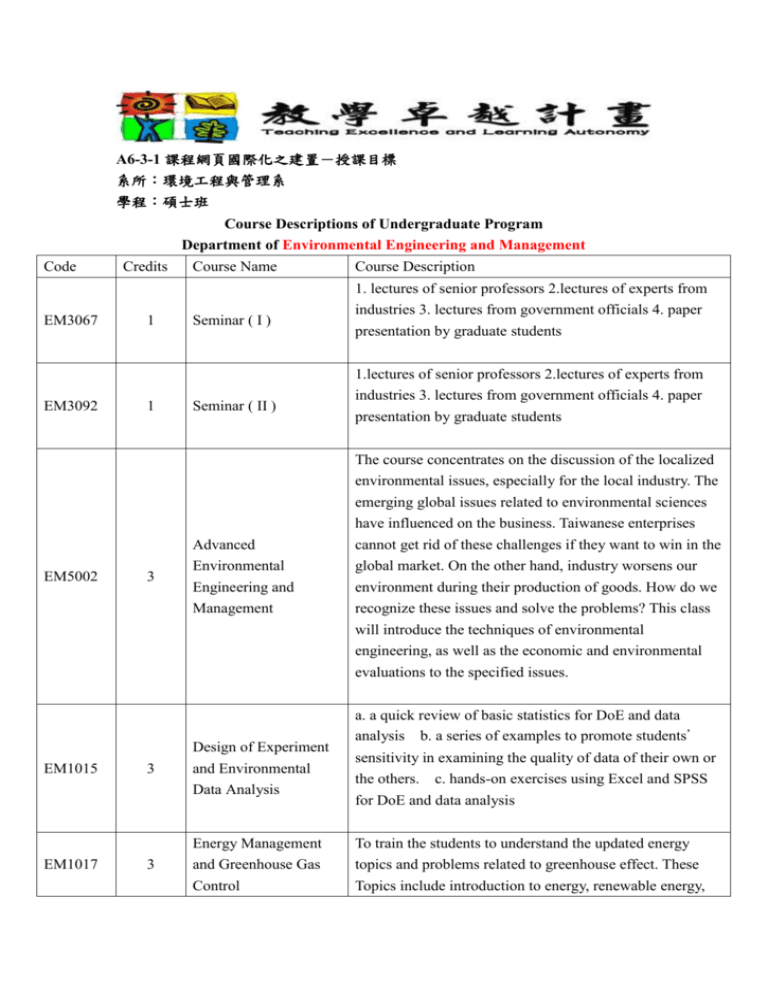
A6-3-1 課程網頁國際化之建置-授課目標 系所:環境工程與管理系 學程:碩士班 Course Descriptions of Undergraduate Program Department of Environmental Engineering and Management Code EM3067 EM3092 Credits 1 1 Course Name Seminar ( I ) Seminar ( II ) Course Description 1. lectures of senior professors 2.lectures of experts from industries 3. lectures from government officials 4. paper presentation by graduate students 1.lectures of senior professors 2.lectures of experts from industries 3. lectures from government officials 4. paper presentation by graduate students The course concentrates on the discussion of the localized environmental issues, especially for the local industry. The emerging global issues related to environmental sciences EM5002 EM1015 EM1017 3 Advanced Environmental Engineering and Management 3 Design of Experiment and Environmental Data Analysis 3 Energy Management and Greenhouse Gas Control have influenced on the business. Taiwanese enterprises cannot get rid of these challenges if they want to win in the global market. On the other hand, industry worsens our environment during their production of goods. How do we recognize these issues and solve the problems? This class will introduce the techniques of environmental engineering, as well as the economic and environmental evaluations to the specified issues. a. a quick review of basic statistics for DoE and data analysis b. a series of examples to promote students’ sensitivity in examining the quality of data of their own or the others. c. hands-on exercises using Excel and SPSS for DoE and data analysis To train the students to understand the updated energy topics and problems related to greenhouse effect. These Topics include introduction to energy, renewable energy, Code Credits Course Name Course Description energy management, energy and greenhouse effect, ISO standard, national regulation and management system, GHGs reduction plan, GHGs validation/verification and carbon dioxide reduction and recovery. EM3076 EM3077 2 2 Special topics Environmental management and system analysis ( 1 ) Special topics Environmental pollution control ( 2 ) With the literature review in environmental management and decision making, the students will be trained to have integrated concepts in this field and able to apply the concepts to their own research thereafter. This course will be designed to hold four union group meetings on topic of pollution control technology during the semester. Each graduate student has to prepare one page abstract for his research progress in meetings. The course especially emphasizes student’s oral presentation and class participation. The subjects of pollution control technology include: industrial wastewater treatment, wastewater reclamation and reuse, biological process development, environmental biotechnology and biological process modeling and application. Through the joint meeting and mutual discussion in class, the graduate student may learn complementary area on the topic of pollution control technology. Special topics This course will be designed to hold four union group meetings on topic of pollution control technology during the semester. Each graduate student has to prepare one page abstract for his research progress in meetings. The course especially emphasizes student’s oral presentation and class participation. The subjects of pollution control EM3078 2 Environmental pollution control ( 1 ) technology include: industrial wastewater treatment, wastewater reclamation and reuse, biological process development, environmental biotechnology and biological process modeling and application. Through the joint meeting and mutual discussion in class, the graduate student may learn complementary area on the topic of pollution control technology. EM3079 2 Special topics With the literature review in environmental management Code EM3080 Credits 2 Course Name Course Description Environmental management and system analysis ( 2 ) and decision making, the students will be trained to have integrated concepts in this field and able to apply the concepts to their own research thereafter. Specific topics Environmental remediation processes (1) EM3081 2 Specific topics Environmental remediation processes (2) The course is belong to students and their adviser. Students need to meet with professors organized in the remediation research groups to discuss their studies on the environmental remediation at least one time a week. Through the brainstorm and discussion, students can obtain broader and deeper knowledge. Therefore, students is capable of developing theory and innovative technology to enhance the research quality. The course is belong to students and their adviser. Students need to meet with professors organized in the remediation research groups to discuss their studies on the environmental remediation at least one time a week. Through the brainstorm and discussion, students can obtain broader and deeper knowledge. Therefore, students are capable of developing theory and innovative technology to enhance the research quality. EM3082 EM3083 2 2 Special topics Environmental management and system analysis ( 3 ) Special topics Environmental management and system analysis ( 4 ) EM3084 2 Special topics Environmental pollution control ( 3 ) With the literature review in environmental management and decision making, the students will be trained to have integrated concepts in this field and able to apply the concepts to their own research thereafter. With the literature review in environmental management and decision making, the students will be trained to have integrated concepts in this field and able to apply the concepts to their own research thereafter. This course will be designed to hold four union group meetings on topic of pollution control technology during the semester. Each graduate student has to prepare one page abstract for his research progress in meetings. The course especially emphasizes student’s oral presentation and class participation. The subjects of pollution control Code Credits Course Name Course Description technology include: industrial wastewater treatment, wastewater reclamation and reuse, biological process development, environmental biotechnology and biological process modeling and application. Through the joint meeting and mutual discussion in class, the graduate student may learn complementary area on the topic of pollution control technology. Special topics EM3085 EM3086 2 2 Environmental remediation processes (3) Special topics Environmental remediation processes (4) Special topics The course is belong to students and their adviser. Students need to meet with professors organized in the remediation research groups to discuss their studies on the environmental remediation at least one time a week. Through the brainstorm and discussion, students can obtain broader and deeper knowledge. Therefore, students are capable of developing theory and innovative technology to enhance the research quality. The course is belong to students and their adviser. Students need to meet with professors organized in the remediation research groups to discuss their studies on the environmental remediation at least one time a week. Through the brainstorm and discussion, students can obtain broader and deeper knowledge. Therefore, students are capable of developing theory and innovative technology to enhance the research quality. This course will be designed to hold four union group meetings on topic of pollution control technology during the semester. Each graduate student has to prepare one page abstract for his research progress in meetings. The course especially emphasizes student’s oral presentation and class participation. The subjects of pollution control EM3087 2 Environmental pollution control ( 4 ) technology include: industrial wastewater treatment, wastewater reclamation and reuse, biological process development, environmental biotechnology and biological process modeling and application. Through the joint meeting and mutual discussion in class, the graduate student may learn complementary area on the topic of pollution control technology. EM3088 2 Special Topics The course is executed by students and their adviser Code EM3089 Credits 2 Course Name Course Description -Environmental Monitoring ( 1 ) together. Students need to meet with their advisor at least one time a week, and every month has one time-united meeting for every students and advisors. The topics include the trace analysis and environmental monitoring of gas phase, water, and soil. Through this course, students obtain advisor’s assistance directly and proceed deeper study about his/her research. Special Topics -Environmental Monitoring ( 2 ) EM3090 EM3091 EM3093 EM3094 EM4060 EM5009 The course is decided by students and their adviser. Students need to meeting with their advisor at least one time a week, and every month has one time meeting for every students and advisors. 2 Special Topics -Environmental Monitoring ( 3 ) The course is executed by students and their adviser together. Students need to meet with their advisor at least one time a week, and every month has one time-united meeting for every students and advisors. The topics include the trace analysis and environmental monitoring of gas phase, water, and soil. Through this course, students obtain advisor’s assistance directly and proceed deeper study about his/her research. 2 Special Topics -Environmental Monitoring ( 4 ) The course is decided by students and their adviser. Students need to meeting with their advisor at least one time a week, and every month has one time meeting for every students and advisors. Seminar III 1. lectures of senior professors 2.lectures of experts from industries 3. lectures from government officials 4. paper presentation by graduate students Seminar IV 1. lectures of senior professors 2.lectures of experts from industries 3. lectures from government officials 4. paper presentation by graduate students 3 Water resource management This course introduces the methodologies to solve the problems in resources management and planning based on system analysis theories. The course is divided into seven parts, in which several case studies are involved for practical training. 3 Environmental Biotechnology Environmental biotechnology utilizes microorganisms to improve environmental quality. This course introduces the basic principles and application of environmental 0 0 Code Credits Course Name Course Description biotechnology. The basic principles include basics of microbiology, molecular biology and microbial kinetics. The topics of application are molecular biotechnology, nutrient removal and bioremediation. EM5011 EM5014 3 3 Environmental Biokinetic Mechanics Environmental Toxicology The course investigates various fields in environmental biokinetic mechanics, including types of biokinetics, enzyme kinetics, activated sludge population dynamics, biofilm kinetics, transportation dynamics, river biokinetics, anaerobic biokinetics, biokinetic model, air biofilter, and biokinetics in soil. The course not only introduces the principle of each field of biokinetics, also the basic mathematical technique and calculated method. The course set up the basic toxicological concept on environment for student, investigate the methodology and elucidate the experimental procedure of environmental toxicology for practical use. This course introduces to students the fundamental concept EM5015 EM5016 EM5018 3 3 3 Fundamental of Nanotechnology Special Topics in Nanometer Design for Environment of nano-science and nano-technology. It emphasizes the significance of differences between micro-scale and nano-scale materials in physical and chemical characteristics. Then the course introduces to the preparation technique for nano-scale materials and the instrumental principles of the measurements and identifications of nano-scale materials. The contents of this course comprise the fundamental of nanometer material, technology, and applications. The nanometer employed in environmental engineering is also covered. The purpose of this course is to assist students understand the nanometer knowledge and help students fit the new competition of industries. The class will discuss the topic issues of environmental concerns in the product and process development, life cycle assessment, and product stewardship. Code EM5021 EM5022 EM5023 Credits 3 3 2 Course Name Course Description Applications of Environmental Nanometer Technology The contents of this course comprise the classification of particulate, formation, mechanisms, and size distribution. Besides, the reaction chemistry occurred in the transportation/transformation process would be discussed. Advanced Solid Waste The objective of this course is to provide students to understand the solid waste treatment technology. The subjects of the course will include: the definition of solid waste, waste treatment and disposal regulation, waste source and property, collection and transportation, Treatment Review on Environmental Topics pretreatment (resource recovery), storage and treatment, incineration, landfill, solidification, biotreatment, hazardous waste management, hazardous material spill control technology. To train the students to evaluate the updated concerned topics and problems related to environment. This course is to introduce the applications about the EM5024 EM5025 EM5026 3 Environmental of Solid Chemistry chemical composition of soil; soil minerals and soil organic matter; soil solution ; mid-term examination; soil electrochemical phenomena and soil particle surfaces; soil adsorption phenomena and soil exchangeable ion of soil environmental. 3 Advanced Environmental Toxicology This course is to investigate toxicology of metals, other inorganic chemicals and organic compounds , study the pesticide toxicology and elucidate the principal and application of risk assessment. 3 Assessment Technology of Biological Toxicity in Environment This course was designed for understanding of the principle together with the method in the safety evaluation techniques. It prepares foe developing an insight in regard to proper application of experimental results, especially on environmental and bioproduct to market Code EM5031 Credits 3 Course Name Environmental Practices for Industry Course Description New Paradigm of Business in the modern enterprises includes: (1) Smarting companies are realizing the integral part that EMS play in business. (2) Companies that have implemented an EMS have become more efficient, responsive, and competitive. (3) ISO’s EMS standards provide a framework for proactively controlling and managing environmental impacts throughout any companies. Therefore, the goals of this course include: introduction to end-of-pipe technologies, waste minimization, environmental management system, green supply chains, and green product management. EM6030 3 Study and Reading of Environmental Literature Selected literature in English regarding the fields of environmental engineering and management is used as teaching materials. At the first beginning, the scientific reports including the significance of their structures and formats are introduced. Correspondingly, the approaching and process of finishing a Master thesis are also emphasized in the lectures. All reading and teaching materials are in English to enhance students’ ability in understanding and synthesizing English materials. EM6031 3 Environmental Decision Analysis This course introduces the basic concepts, principles and analytical tools of the various decision theories in order to fully understand environmental issues as well as to utilize system analysis and decision tools in a decision-making process. The fate and distribution of contaminants are controlled by chemical equilibrium and kinetics. This course help graduates understand how contaminants are influenced by EM6032 3 Environmental Thermodynamics and Kinetics the nature and embed graduates the fundamentals for future research. The course covers Classical Thermodynamics (laws and equilibrium), Multicomponent Equilibrium (nonideal solution,fugacity), Thermodynamics in environment (air-water and soil-water), and Kinetics in environment (kinetics laws, catalysis,redox reactions). Code EM6034 Credits 3 Course Name Application of Environmental Instrumental Analysis Course Description At the beginning, the course introduces to students the significance of the difference between traditional and instrumental analysis. Then it introduces to the concept and importance of quality assurance and quality control in instrumental analysis. The course will emphasize the fundamental principles of the instrumental used in the measurements in environmental science and technology, and the significance of the obtained data. This course provides the characteristics of risk and its assessment and management。Teaching content contains EM6038 3 Risk Assessment and Management process description, hazard identification, source models, fault tree analysis, consequence analysis, exposure assessment, dose response and risk characterization, radiation risk assessment, environmental assessment, structural activity relationships, risk management, managing risk, regulation and ISO 14000. This course introduces the theory and application of the EM6039 EM6040 EM6046 3 2 3 Soil and Groundwater Remediation Writing of Science and Technology Reports Advanced oxidation Technology soil and groundwater remediation technique to student. The contents are divided two parts. First section begins with the nature of soil, groundwater and pollutants, then introduce the mechanism of chemical fate and transport in the underground. Second part introduces the principles, application and design for remediation techniques. To train the students to improve their ability of writing science and technology reports as well as theses and reading science papers. The course investigates various fields in advanced oxidation processes. To train the students to evaluate the updated technology related to pollution control. With the literature review in advanced oxidation technology, the students will be trained to have integrated knowledge in this field and able to apply the knowledge to their own research thereafter. Code EM6049 Credits 3 Course Name Course Description Special Topics of Safety Evaluation Technique for Bioproducts This course is designed for understanding of the principle together with the methods in the safety evaluation techniques. It prepares for developing an insight in regard to proper application of experimental results, especially on bioproducts. 填表人:__________ 日期:______ 單位主管:__________ 日期:______
